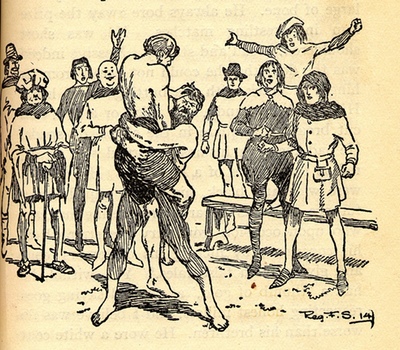
Monday
Congratulations to the Rams for winning their first Super Bowl for Los Angeles (they won one when they moved to St. Louis before returning to Los Angeles). When, in the third quarter, I thought the Bengals would win, I started concocting a blog post featuring William Blake’s “The Tyger.” In the poem, Blake contrasts this fearsome predator with a member of the sheep family. Not a ram, to be sure—but then, at that point in the game, the Bengals had reduced the Ram to lambs, especially when it came to the run game.
Tyger Tyger, burning bright,
In the forests of the night;
What immortal hand or eye,
Could frame thy fearful symmetry?
In what distant deeps or skies.
Burnt the fire of thine eyes?
On what wings dare he aspire?
What the hand, dare seize the fire?
And what shoulder, & what art,
Could twist the sinews of thy heart?
And when thy heart began to beat,
What dread hand? & what dread feet?
What the hammer? what the chain,
In what furnace was thy brain?
What the anvil? what dread grasp,
Dare its deadly terrors clasp!
When the stars threw down their spears
And water’d heaven with their tears:
Did he smile his work to see?
Did he who made the Lamb make thee?
Tyger Tyger burning bright,
In the forests of the night:
What immortal hand or eye,
Dare frame thy fearful symmetry?
Cincinnati was proving very much to be a hammer, and the Los Angeles backs were experiencing their “dread grasp” on virtually every running play. In the poem, Blake is amazed that a supposedly benign god—the god who creates sweet little lambs—could also hammer out such a creature on a celestial anvil. I imagine him watching an American football game and wondering what kind of a divinity would create 250-pound linebackers that run like deer and hit with the force of sledgehammers.
But then Los Angeles rose to the occasion, finally behaving more like their moniker as they charged into the Cincinnati offensive line. They got to the Bengals’ talented quarterback multiple times, including on the play that effectively ended the game. As distraught as the Bengals are, maybe they’ll take consolation from the fact that I compare their opponent to one of Chaucer’s most disagreeable characters.
The miller is noted for his wrestling skills, for which he will often win—wait for it—“the ram.” (I’m not sure why a ram would have been the prize for which they were fighting.) But that’s not his only association with the animal. The miller is also famous for running into doors with his head, thereupon either breaking them or heaving them off their hinges. His physical build, as described by Chaucer, would make him an ideal football player:
The MILLERE was a stout carl for the nones;
Ful byg he was of brawn, and eek of bones.
He’s also a drunkard and a loud-mouthed braggart who tells dirty stories. He plays the bagpipes (in other words, he’s full of hot air) and insists on always taking the lead. I haven’t followed the Rams team close enough to know whether there are any members who fit that description.
In any event, here are the relevant lines from Chaucer’s Prologue, with every other line the modern translation.
The MILLERE was a stout carl for the nones;
The MILLER was a stout fellow indeed;
Ful byg he was of brawn, and eek of bones.
He was very strong of muscle, and also of bones.
That proved wel, for over al ther he cam,
That was well proven, for wherever he came,
At wrastlynge he wolde have alwey the ram.
At wrestling he would always take the the prize.
He was short-sholdred, brood, a thikke knarre;
He was stoutly built, broad, a large-framed fellow;
Ther was no dore that he nolde heve of harre,
There was no door that he would not heave off its hinges,
Or breke it at a rennyng with his heed.
Or break it by running at it with his head.
And, oh yes, the miller is often a cheat, stealing from the farmers who bring him their grain. But for ramming things, he’s your man.

